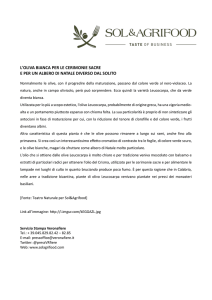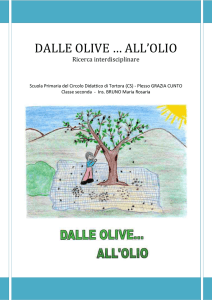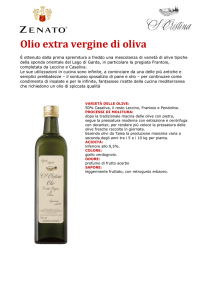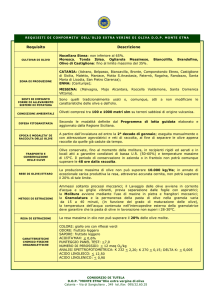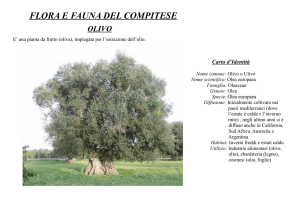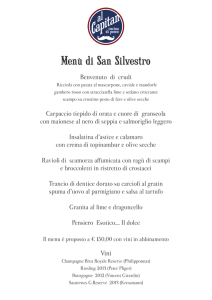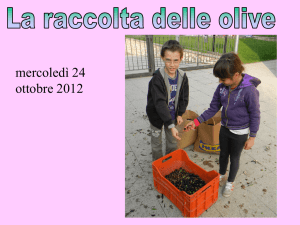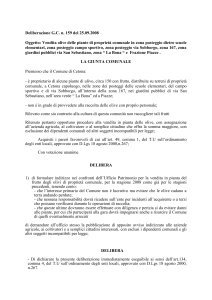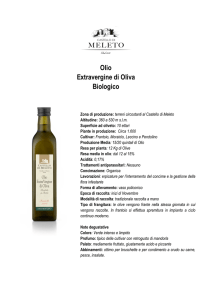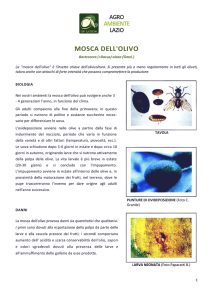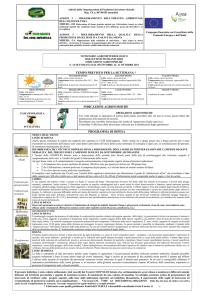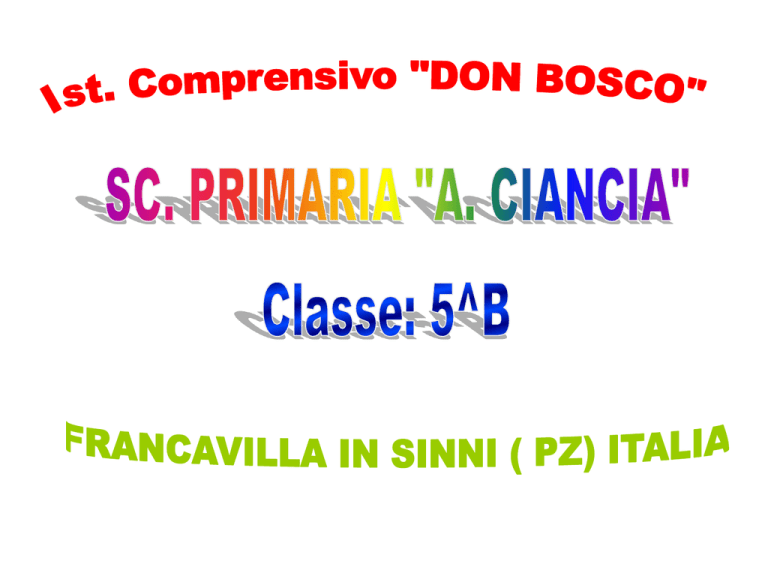
LA PIANTA, IL FRUTTO, LA RACCOLTA
THE PLANT, THE FRUIT, THE HARVEST
La pianta dell’ulivo,come tutti i paesi mediterranei, è tra quelle che
maggiormente caratterizzato il panorama delle nostre campagne
collinari.La coltivazione dell’ulivo è diffusa su tutto il territorio
nazionale, con l’unica esclusione di Valle d’Aosta e Piemonte.
L’olivo, però, è coltivato non solo nei paesi del bacino del
Mediterraneo ma anche nella California, in qualche parte
dell’America centrale e meridionale ed in qualche parte dell’Australia
e dell’Africa meridionale.
The olive tree, as in every mediterranean countries, is among
those ones characterising our hill countries landscape. The olive
tree coltivation is popular on all the national territory, with the only
exclusion of Valle d’Aosta and Piemonte. The olive tree is cultivated
not only in the mediterranean countries but also in California, in
some part of the Central and South America and in some part of
Australia and of South Africa.
Un oliveto con, sullo sfondo, il fiume Sinni e, dall’altro lato, il pendio
della collina su cui si erge il nostro paese.
An olive grove with, on the background, the river Sinni and,on the
other side, the slope of the hill on which our town rises.
Illuminato dal sole autunnale, un altro piccolo oliveto proprio ai piedi
del nostro paese
Elluminated by the Autumn sun, another little olive grove just at the
foot of our town.
L’olivo è una pianta sempreverde dei climi temperati che può
raggiungere anche i 20 metri di altezza.
The olive tree is an evergreen plant of the temperate climates that can
also reach the 20 metres of heigth.
Il tronco è spesso contorto,
screpolato e vuoto, con la parte
basale più espansa.
The trunk is often twisted,
cracked and empty, with the
bottom part more expanded.
Le foglie sono piccole, di un ovale molto allungato, con i margini
interni…
the leaves are small, with a very long oval, with internal edges…
… sono opposte, lucide e di colore verde scuro nella parte superiore…
… are opposite, shining and with a dark green colour on the superior
side…
…e argentee in quella inferiore :la loro formazione riduce la traspirazione per evitare perdite
d’acqua. si formano sul ramo dalla primavera all’autunno e restano vitali per un anno o poco
più.
… and silver on the inferior one: their formation reduces the transpiration to avoid the loss of
water. They forme themselves on the branch from the Spring to the Autumn and remain
lively for a year or a little more.
Il frutto da cui si estrae l’olio è una drupa costituita da un epicarpo (buccia), un
mesacarpo (polpa), un endocarpo (nocciolo). È di forma ovale, di colore prima
verdastro e poi nero-violaceo a maturità; la polpa oleosa aderisce fortemente al
nocciolo.
The fruit from which we extract the oil is a “drupa” formed by an “epicarpo”
(peel), a “mesacarpo” (pulp), an “endocarpo” (stone). It’s of an oval form, first of
a greenish colour ad then black-purple in the maturity; the oily pulp adheres
strongly to the stone.
La raccolta delle olive
la raccolta delle olive inizia alla fine di ottobre e i primi
giorni di novembre e può avvenire in vari modi:
The olive harvest
the olive harvest starts at the end of October and the first
days of November and can be in different ways:
“pettinatura”:passare nella chioma dei pettini chiamati “rastrelli”;
“combing”:pass in the foliage some combs called Rakes;
“abbacchiatura”:raccogliere
le olive battendo le piante con
pertiche;
“downhearting” :harvest the
olives hitting the plants with perches;
“brucatura”:staccare le olive una ad una con le mani dai rami con
l’aiuto di scale;
“croping”:leave the olives one for one with the hands with the help
of stairs.
“raccattatura”: raccogliere le olive cadute a terra;
“picking up”: harvest the fallen olives on the ground.
“raccolta meccanica”:scuotere le piante con mezzi
meccanici e provocare la caduta delle olive su apposite reti.
“Mechanical harvest”:shake the plants with mechanical
means and let the olives fall on provided nets.

